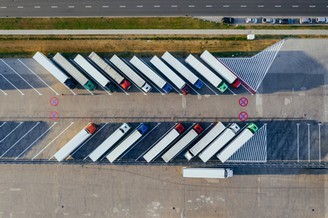The health crisis has revealed the vulnerability of global and interdependent supply chains, particularly in the supply of health facilities. As traditional forecasting tools have been badly damaged, it has also confirmed the need for real-time visibility on all asset flows and the necessity to pursue eco-responsible measures.
With recovery looming on the horizon, the question arises of a new normality around the notion of resilience for supply chain networks (in other words, the ability to bounce back).
As a supply chain solution provider, Ownest has partnered with operational consulting firm RGP to co-host its first webinar dedicated to "digital transformation of the supply chain in a post-coronavirus era". This was an opportunity to provide cross-experience feedback from French industry key players such as La Poste Group, SNCF Réseau and Toyota Material Handling France. This event was accompanied by the decoding of insights from RGP consulting. It resulted that while all of them noted a significant impact on their operations, each of them successfully implemented new solutions to resist and accelerate its digital transformation. The challenge of digitization is twofold: to quickly achieve a return to normalcy and to boost the company's performance.
An unprecedented and immediate impact on supply chain networks
The webinar was accompanied by a live survey conducted by RGP on the impact of the coronavirus crisis on supply chain activities. It resulted that most of the professionals interviewed had been impacted. However, not all of them experienced a supply chain disruption. This is the case of the world leader in forklift trucks, Toyota Material Handling France, which had chosen to be close to production (France, Sweden and Italy) before coronavirus, a policy that will be pursued by the group.
"We had a twofold impact: a temporary slowdown in activity and an acceleration with a desire to transform" - Clément Bergé Lefranc, Chairman and Co-founder of Ownest
The blockchain solution editor Ownest has observed, via its dashboard visualizing in real time the flow of assets, the immediate impact of the health crisis on the supply chain activity. On the one hand, part of the logistics networks stopped, on the other hand, activity flows suddenly increased (following compensation mechanisms).
Eric Loustau, Managing Director of the French branch of Toyota Material Handling, observed a shift in demand from distributors and logisticians for the rental of its forklift trucks to cope with this unprecedented context.
A crisis revealing the capacity of actors to adapt to the new normality of "contactless".
One of the major levers detected by RGP consulting to promote recovery is the integration of short loops between operational strategies.
Frédéric Petit, President France and VP Europe at RGP, recalled the quotes of Romain Roulleau, Marketing Director of Kingfisher France (Brico Dépôt and Castorama in France): "Before, like any company, we used to take a long time to make decisions, today everything has been accelerated by 10 or 20. Decisions are implemented in 48 hours. Between saying digital is important and living it every day is not the same. It's this forced acculturation of organizations to digital that will have an impact on the marketing of brands".
All of the stakeholders report accelerated decision making.
The crisis has also forced organizations to review their working methods, processes and tools for field teams.
Thus, according to its Logistics and Transport BU Director Alexandre Berger, La Poste Group has had to update its organisational rules, in line with changes in containment measures, whether for carrying, delivery or collecting. The mission consisted in ensuring business continuity all over France (and not only in main cities) while complying with the new social distancing measures. In addition, La Poste Group has developed a whole range of solutions to meet new needs such as the delivery of homework, medicines, foodstuffs and IT tools.
In crisis situations, the effect of experience and anticipation clearly reduces the impact on operations. Toyota Material Handling France had already initiated its digitization long ago: pre-COVID, the specialist in handling equipment, had migrated all its telephony and order management to the cloud.
Ownest, for its part, had, pre-COVID, a dual project transferring responsibility to two secure phones via SaaS codes (instead of one) and the digitization of the consignment note (e-CMR). These projects were rapidly deployed to reduce the number of virus vectors.
In Frédéric Petit's view, in order to increase the responsiveness of logistics specialists and to accurately audit the impact of the situation, it is important to remain close to the teams in the field. In order to prepare the strategy and new objectives, a post-coronavirus team needs to be set up quickly. Another reflex to adopt is to abandon non-strategic subjects to focus on what will become the "New Normal".
Another consequence of the crisis: the overhaul of the logistics profession. The La Poste Group has been led to transport fresh goods, which has led it to strengthen its cold chain management.
 @marcinjozwiak / Unsplash
@marcinjozwiak / UnsplashTowards a more resilient supply chain 4.0 industry focused on digitalization
Industry 4.0, the spearhead of the accelerator initiated by the head of the CMA CGM shipowner, ZEBOX, which Ownest recently joined, consists of an interconnection between systems made possible by new technologies.
Digital transformation: a lever to facilitate recovery in the post-COVID era
All speakers noted the acceleration of the digital transformation (against the backdrop of the democratization of telecommuting) and the overcoming of most resistances to change. These remarks echoed those of the McKinsey firm, which stated in a recent study that in two months of confinement, the company had taken a five-year leap in its digital transformation. Thus, Toyota Material Handling France, which had for a long time secured its paper supplier in order to comply with legal obligations related to OIVs French specificity (Operator of vital importance) via the issuing of BCPs (Business Continuity Plans), has digitised all of its processes.
"For years now, the logistics business has had to digitize and we have structural obstacles linked to the supply chain: it never stops, it is present everywhere and for 20 years we have had a considerable increase in the volume of activity. We are on such an inertia that starting a small-scale digitalization seems difficult." Clément Bergé Lefranc, President and co-founder of Ownest.
In many ways the crisis has acted as a catalyst for the supply chain by accentuating the pre-VIDOC balance of power.
Speakers insisted on the idea of acceleration in continuity. Thus, certain subjects such as telecommuting and AR (augmented reality) at SNCF réseau, proximity of manufacturing as well as the digitization of administrative documents at Toyota Material Handling France or the fight against the digital divide and the democratization of digital identity at La Poste Group, will become even more important.
According to Emmanuel Cox, Digital Transformation Officer at SNCF Réseau, COVID is leading to a rethinking of the way organisations operate in the future and advocating a "collaborative but not face-to-face" approach. This is why the question of being able to assist a trackside maintainer with remote expertise via secure digital tools is even more important in such a period of crisis.
This leads us to think about digital identity in a stronger and stronger way, contactless validation [...] of the proper handover of an asset, without having to sign the smartphone of an operator on site. Alexandre Berger, Director of the Logistics and Transport BU of La Poste Group
Clément Bergé Lefranc, Chairman of Ownest, for his part, praised the adaptability of the major groups who wanted to quickly initiate or even accelerate their digital transformation projects.
For the founder of Ownest, the period is a unique moment to accelerate change by capitalizing on the adoption rate of companies implementing new technologies.
"Digital is becoming even more of a lever for getting back to normal and gaining performance so that we can make up for lost time." Emmanuel Cox, Digital Transformation Officer at SNCF Réseau
According to RGP consulting, the adoption of change can be facilitated by 2 means: the system of agile prioritization or giving meaningful digital transformation through a long-term vision involving a voluntary sustainable policy. On the latter point, recently, in May, 90 CEOs of major companies signed an economic recovery plan that is an accelerator of the ecological transition.
"In terms of orientations of transformation opportunities, we will continue in this axis of respect for the environment and proximity of manufacturing." Eric Loustau, Managing Director of Toyota Material Handling France
 @federicobeccari / Unsplash
@federicobeccari / UnsplashBlockchain among the 3 strategic technologies at the service of the sector
The important thing is to make explicit the purpose of the implementation of a given technology, it being understood that it must be part of a well thought-out strategy. This is how the Ownest solution fits into the crossroads of digital identity, dematerialized transfer and supply chain monitoring.
If we deploy digital tools without profoundly modifying our working methods and processes, we lose the challenge and the associated gain. Emmanuel Cox, Digital Transformation Officer at SNCF Réseau
Frédéric Petit from RGP consulting identifies 3 technologies to improve productivity and competitiveness in the supply chain:
- Data analytics with the implementation of a measurement system in the case of large supplier panels (several tens of thousands).
- Blockchain, which, like the Ownest solution, provides total transparency, in real time, of information flows and products. In a logic of reinsurance of the final consumer, this distributed technology resonates with the strong demands of consumers in terms of transparency on the origin of the product and the location of a product in real time.
- Robotics, either through RPA (Robotic Process Automation) processes in order to optimise automatic processes, or by installing robots in places or areas deemed "at risk" by employees or customers.
"What is clear is that in the face of uncertainty we are all looking for one thing: clarity." Frédéric Petit, President France and Vice President Europe at RGP.
The risk of supply chain disruption is creating a need for greater real-time visibility on the networks, a demand that was already prevalent before the crisis.
The consulting firm RGP urges professionals to deploy a more agile method: The supply chain is still (too) siloed in the direction of customers to suppliers. This change therefore means reconnecting people, helping them to have simple tools and quick decision loops on objectives that have been clearly defined and without forgetting to prioritize.
Summary
As you will have understood, the crisis, unprecedented in its scope and duration, has led to a greater openness to change and to the digital transformation of organizations and processes, an acceleration of decision-making and even a business overhaul.
To conclude, the operational consulting firm RGP invites supply chain professionals to formalize a business recovery plan in 3 parts:
- Clarity of meaning, the essence of the new supply chain strategy;
- Disconnect to better reconnect to the new supply chain demand;
- Integrate short loops.
In addition, it remains important to "not rebuild the past". Indeed, "there is no sustainable transformation project without accompanying the change with the operators in the field".
For Emmanuel Cox, it is therefore the human - process - technology triptych that must be successfully carried out at the same time despite an uncertain context. This implies support and reinsurance, but also a great deal of rethinking and re-engineering.
![Cdiscount 2022 04 01 174830 mhxm]()
![Scnfbis]()
![Saint Laurent]() Company
Company



